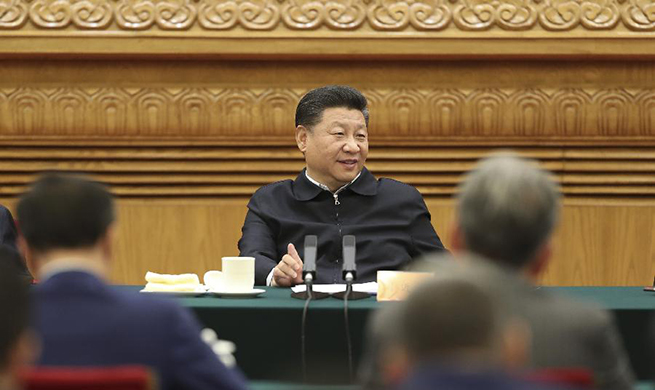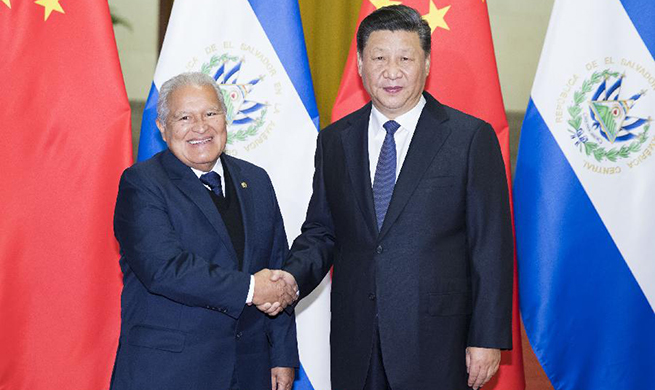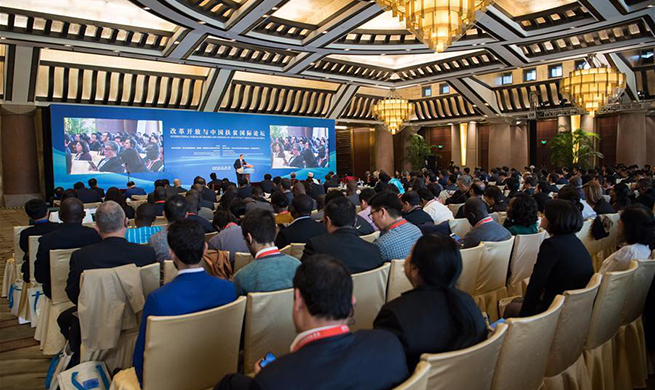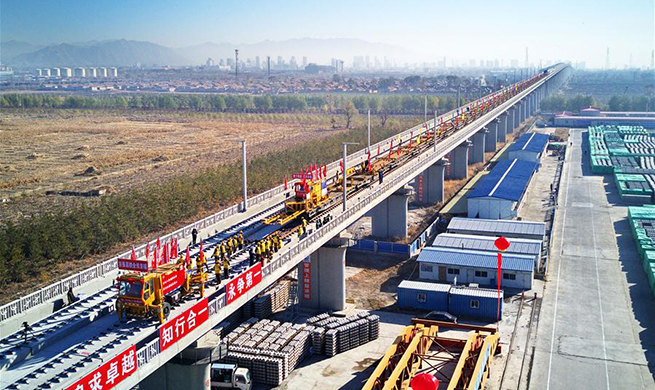WASHINGTON, Nov. 1 (Xinhua) -- The Republic of Korea (ROK) and the United States have signed guidelines on their combined defense after the planned transfer of wartime operational control (OPCON) from Washington to Seoul, paving way for the transfer and setting guiding principles for their future defense cooperation.
TRANSFER OF OPCON
According to a speech transcript released by the Pentagon on Thursday, U.S. defense chief James Mattis and his ROK counterpart Jeong Kyeong-doo attended the 50th annual Security Consultative Meeting at the Pentagon on Wednesday, and signed "Alliance Guiding Principles" after the meeting.
Noting that the document "paves the way for clarifying the conditions-based transition of wartime operational control of our combined forces," Mattis told the media that this document ensures that South Korea will replace the United States to lead the future Combined Forces Command, a mechanism that "will continue to use the combined might of U.S.-ROK alliance to defend the ROK's sovereignty from any external aggression."
"As the ROK prepares to lead our combined defense of the Korean peninsula, I must note the U.S.' strong support for your nation's ongoing efforts to fulfill the conditions for this OPCON transition," he said.
For his part, Jeong said that he and Mattis "assessed that we've made significant progress in our preparation for the transition," adding "we will continue our joint efforts to meet the conditions for wartime OPCON transition in an expedited manner."
Yonhap News Agency quoted ROK Defense Ministry as saying that "the Alliance Guiding Principles are a document that we drew up while thinking of the future of the alliance more than 50 years ahead ... the principles are expected to address citizens' security concerns by presenting a direction for the South Korea-U.S. combined defense system after the OPCON transfer and proclaiming the firmness of the South Korea-U.S. alliance."
It also reported that the two countries had signed a group of other military cooperation documents, including the plans for the Future Command Structure, under which the ROK will dispatch a four-star general to lead the joint command and the U.S. side will name a military official of the same level to be the deputy.
These documents "laid the foundation to stably and expeditiously carry out OPCON transition," Jeong noted.
U.S. FORCES TO STAY IN S. KOREA
According to these documents, the United States will keep its current level of troops stationed on the Korean Peninsula.
Mattis also reaffirmed the U.S. commitment to "the provision of extended deterrence and the maintaining of the U.S. Forces Korea at the current level," Jeong said, referring to the U.S. commitment to using a full range of military capabilities, including nuclear, conventional and missile defense assets.
Jeong also announced that the two nations will conduct the initial operational capability (IOC) certification next year as the first step to evaluate the ROK-led wartime operational capabilities, and "regularly assess and review the implementation progress to determine the specific timing of OPCON transition."
"We can effectively and properly carry out the IOC certification, and thereby, reassure our citizens they do not need to worry about any falls, any decreases, any negative impacts to our military capabilities or our readiness posture," the ROK defense chief noted.
For his part, Mattis added that the two sides also studied "the details of the joint study for the future defense vision of the U.S.-ROK alliance, which will be conducted over the course of this next year."
"This study will examine the role our alliance would play following the final, fully verified denuclearization of the Korean peninsula," he added.
FUTURE JOINT DRILLS
The two nations have decided to suspend several major joint military exercises this year.
Jeong said as for the future major large-scale exercises, the two nations will conduct a review from staff members, and "have the results of the review until 15th of November, and then we'll make our final decision on any major exercises in the next year before the 1st of December."
Only a part of the joint exercises has been suspended at the moment, he noted. "However, if we continue to see a suspension of these large-scale exercises like the Key Resolve and the Ulchi-Freedom Guardian, then we will create ways to make sure that we can mitigate the impact of the suspension of these exercises, including things such as Iraq-U.S. combined staff training to make sure that we don't see any dips in our readiness posture or our military capabilities."
Yonhap reported that the two sides had also finalized their decision to suspend the annual massive Vigilant Ace air exercise, which was originally slated for December, to support the ongoing diplomacy to build trust with the Democratic People's Republic of Korea (DPRK) and encourage its nuclear disarmament.
"Secretary Mattis and I have agreed that we will continue to do our best to support, from a military perspective, the diplomatic efforts of our countries and we'll continue our thought process on how we can move forward from this point on to bring about the complete denuclearization of and establishment of peace on the Korean peninsula, and we'll continue to seek ways in which we can continue to maintain our current level of combined defense posture, as well as our military readiness," Jeong added.
Mattis noted that "clearly the threat from North Korea, at least as expressed by Chairman Kim, has been significantly reduced."
"We are not right now concerned with the loss of combat capability. Clearly, as we go forward, we'll have to make adaptations to ensure we don't lose that capability," he said. "Certain large ones were put on hold, suspended temporarily in order to give the diplomats the best possible effort, because we were making a good faith effort on the military side."
The DPRK has blasted the U.S.-ROK military drills as threatening provocations against it.
The ROK handed over the operational control over its troops to the commander of the U.S.-led command during the 1950-53 Korean War. Seoul took back the peacetime OPCON in 1994, but the United States still possesses wartime OPCON. The transfer of it had been supposed to occur in 2015 but was postponed.













